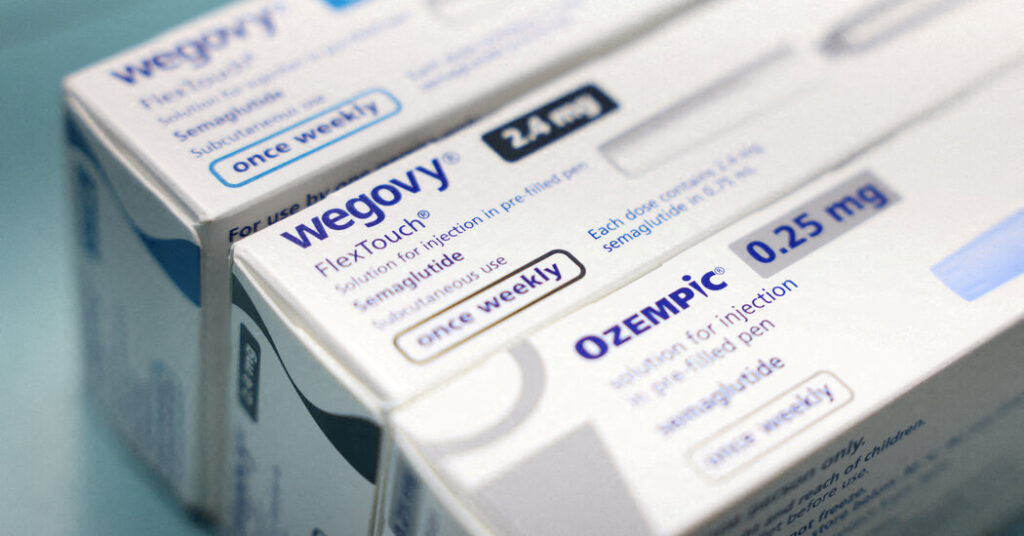Medicare’s prices for the blockbuster weight-loss drugs Ozempic and Wegovy are likely to decline starting in 2027, thanks to their inclusion on a list of medicines whose prices will be negotiated directly between the government and drug makers.
The Biden administration announced the list on Friday, but the incoming Trump administration will oversee the price discussions this year.
Late last year, the Biden administration separately proposed that the federal government expand coverage of weight-loss drugs to millions of Americans, though it’s unclear if the Trump administration will carry out the proposal. Expanding coverage would drive up the government’s overall spending on those medications even if the negotiations result in a deep price cut.
The drugs, made by Novo Nordisk, were selected for price negotiations along with more than a dozen other widely used or costly medications as part of a program created by the Inflation Reduction Act, President Biden’s signature legislation. It is not clear how much Medicare’s prices for Ozempic and Wegovy could drop. It’s possible that the price cut would be small, as it has been for some of the drugs in the negotiation program so far, which would save little money for the government.
But if Medicare negotiates a deep price cut on the weight-loss drugs, it could have ripple effects in the broader market for the medications, which have transformed the treatment of obesity and become a cultural touchstone.
The drugs are in huge demand, but many employers, insurers and government programs do not cover them because the cost is so high. On those insurance plans, only patients who can afford to pay hundreds of dollars per month out of pocket can generally obtain them.
The negotiation program is associated with Mr. Biden but offers President-elect Donald J. Trump the chance to cast himself as a tough negotiator who took on the drug companies and won. Mr. Trump’s administration will be required by law to carry out the program in much the same way the Biden administration did, but the courts or lawmakers could intervene. And several Republicans in Congress have introduced legislation, backed by the drug industry, that would repeal or tweak the program.
Mr. Trump’s pick for health secretary, Robert F. Kennedy Jr., will lead the negotiations if he wins confirmation. He has been vocal in his criticism of Ozempic, which he says is inferior to consuming healthy food, though he recently said such drugs “have a place” in addressing obesity. Mr. Kennedy has spoken critically about drug-company profiteering but has not focused on drug prices.
The law gives the Trump administration a deadline of the end of November to announce Medicare’s new prices for Ozempic, Wegovy and the other drugs on Friday’s list.
Mr. Trump has not said whether he wants to expand Medicare’s coverage of weight-loss drugs. Nor has he said whether he supports the Medicare negotiation program, though he floated the idea in his 2016 campaign before dropping it in his first term. Trump officials could find ways to weaken the program without repealing it, such as by being less aggressive in negotiations.
The weight-loss drug picked for negotiations, semaglutide, is marketed as Ozempic for diabetes and as Wegovy for obesity. Medicare now covers Ozempic for millions of people with diabetes and Wegovy for a much smaller number who have both heart problems and obesity, but the agency is not allowed to cover Wegovy for weight loss alone. The Biden administration’s proposal would sidestep that restriction, expanding coverage to millions of people with obesity on Medicare and Medicaid.
Medicare does not disclose how much it pays for drugs once often-hefty discounts are taken into account. But it is clear that Medicare’s discounted prices for semaglutide products are already thousands of dollars less than the sticker prices of $12,000 per year for Ozempic and $16,000 per year for Wegovy.
The nonpartisan Congressional Budget Office projected that thanks to the negotiations, Medicare’s prices for semaglutide products “will fall substantially beginning in 2027.”
That would also open the door to lower prices for competing obesity drugs like Eli Lilly’s Zepbound. Pharmacy benefit managers, which negotiate drug prices, would have more leverage to demand lower prices closer to what the government pays for semaglutide. If the government were to expand coverage of obesity drugs, the amount Medicare would spend on each patient taking one of them would fall by about a third in 2027, the C.B.O. projected.
That would slow the growth of the government’s spending on obesity drugs even as more people on Medicare started using them.
New prices for the 10 drugs in the first round of price negotiations were announced last summer. Those prices will go into effect next year.
Drugmakers were relieved that those cuts were not deeper. They have sued, unsuccessfully, to block the price negotiation program.
https://www.nytimes.com/2025/01/17/health/medicare-prices-ozempic-wegovy.html


